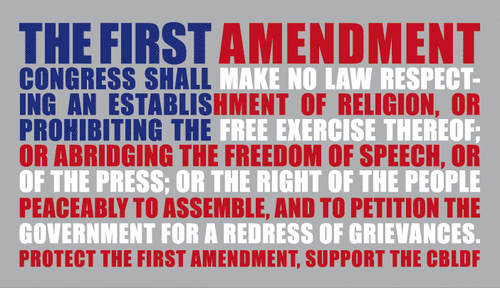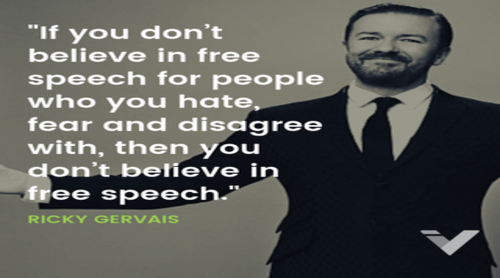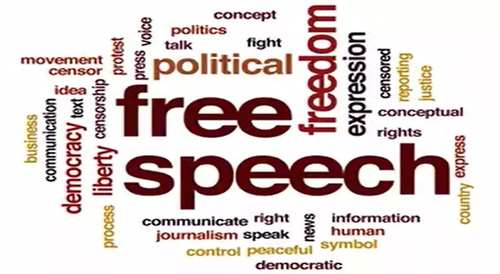|
May 4, 2022
As Biden Unveils His Ministry Of Truth He MUST Remember, 'Free Speech' Is NOT A One Way Street! This VERY DANGEROUS Trend Will Lead To Tyranny With Free Speech Under All-Out Attack
- Even Controversial Speech Must Be Defended If We're To Remain Free People

By Cameron Keegan of the Blue State Conservative for All News Pipeline
(ANP: It's quite disturbing to us that so many people think that 'free speech' should only be 'speech' that THEY THEMSELVES agree with! With us now witnessing this VERY DANGEROUS trend from both the left and the right, this excellent new story sums up our feelings perfectly. As a side note, if anyone reading this story decides to visit our comment section below to 'weigh in', please understand that the Disqus commenting system ALLOWS YOU to CENSOR any comment/commenter that you do not agree with. Please DO NOT ask ANP to censor other commenters. We are NOT the speech police. The information at this link explains exactly how to BLOCK any commenters you might disagree with. Thank You. And God Bless.)
While younger Americans are finding ways to engage in much-needed discourse outside mainstream platforms, we must develop resilience to accept the consequences of free speech.
The freer a nation, the harder it is for that nation’s government to suppress the voice of its people. On this note, the First Amendment is our best defense against the government—and the most effective weapon against tyranny and totalitarianism.
Protecting the heart of the First Amendment means guarding the flow of ideas and inviting discussion around those ideas. The biggest misunderstanding about the First Amendment is that it protects individuals against what they might consider offensive language and harmful ideas spurred by their fellow citizens.
For example, permitting freedom of expression or “free speech” most definitely gives rise to ideas deemed hurtful toward specific demographics of the public. Supporters of “speech regulation” argue that speech they define as “hateful” is comparable to inciting physical violence. Yet, regulating speech around not offending someone will consequently lead to the ultimate demise of American society.
Reasoning vs. offense taken
When we’re receiving passive-aggressive comments or downright harsh words, it is not unusual to become upset and feel rejected, particularly from those we seek acceptance. It’s also not uncommon to feel outraged and start conjuring thoughts of revenge.
It is this kind of intense, emotional response that has plagued colleges for several years now, inspiring protests to ban speakers perceived as hate-mongering or divisive, leaving their ideas unchallenged.
The problem is that the outrage and offense taken are incompatible with dispassionate reasoning.
Consider the following: to pass any regulation of speech through government checks and balances requires a compelling interest deemed necessary instead of preference or choice. For example, the necessity to prevent fraud is a compelling interest.
An agreement following a dialogue that results in fraudulent activity is not a form of speech that someone can choose to ignore, as might be the case with experienced “hate speech.” There is no better way to regulate such speech than to ban it entirely; it is a lawless act described objectively in clear terms, which can deny an individual of their livelihood and property.
Sadly, many are advocating against their own interests by arguing for regulating speech interpreted as discriminatory. Allowing the government to control speech by banning speech deemed hateful by a group of—wait for it—experts would set a dangerous precedent. The problem is that permitting the government to engage in restricting free speech is an abomination to the First Amendment.
Advocates of speech regulation would contend that hate speech can be clearly defined as “public speech that expresses hate or encourages violence towards a person or group based on…race, religion, sex, or sexual orientation.”
Well, how is hate speech defined, and who strictly gets to define hate speech? Many of us cynical skeptics would say it’s whatever Apple, Google and Facebook say it is on a given day or, more to the point, whatever the powers-to-be with overriding influence on these mammoth bigger-than-government companies say it’s going to be.
(ANP FUNDRAISER: Due to heavy censorship by 'big tech' upon ANP articles, we're running a fundraising drive. We also want to thank everybody who has donated to ANP over the years. With donations and ad revenue all that keep ANP online, if you're able, please consider donating to ANP to help keep us in this fight for America's future at this absolutely critical time in US history. During a time of systematic, 'big tech' censorship and widespread institutional corruption, truth-seeking media and alternative views are crucial, and EVERY little bit helps more than you could know!)

Hate speech does not equate to physical violence
As we experience it, hate speech can be very unpleasant to sensitive beings. Yet, as unkind and displeasing the nature of hate speech, it is not physical violence.
To those of us who hear words spewed from a place of ignorance or hostility, it might be challenging to differentiate such language from actual physical violence, especially when feeling emotionally distraught. Some would even argue that the pain felt might lead us to self-harm or seek revenge.
But when someone punches us in the face, it’s almost impossible to ignore them and keep walking without experiencing another punch, right?
Unlike the act of physical violence, hate-ridden words will do as much damage as we allow. And some will indeed struggle more than others. We can block a particular user, ignore or strategically argue with that co-worker who keeps backstabbing and challenge someone’s rhetoric, assuming they’re open to listening.
The risk of equating physical violence to hate speech is that violence itself may become a justified response. For example, suppose someone feels provoked enough to lash out at the wrongdoer spewing hate speech and then declares that such a reaction is justified towards the perpetrator.
Considering the case of Brandenburg vs. Ohio (1969), the Supreme Court examined whether a Ku Klux Klan speaker was convicted adequately under an Ohio criminal syndicalism law. The Court established that speech advocating illegal conduct is protected under the First Amendment and put forward a test: (1) speech can be prohibited if it is “directed at inciting or producing imminent lawless action” and (2) it is “likely to incite or produce such action.”
In other words, speech that may result in lawless acts fails this test. Speech that may lead someone to engage in lawless conduct but is not considered imminent fails this test.
Nowadays, out of caution, an ex-boyfriend might receive a knock on the door from the cops if he threatens to harm his former girlfriend on social media.
Building emotional resilience and assertiveness
Let us play a spade as a spade. Currently, in America, major cities have been awash with demonstrations and protests. But when a public speaker with a libertarian or conservative disposition promotes ideas that many find offensive, are we going to conclude the speaker is engaging in hate speech and have their voice restricted?
In China, harshly criticizing the Chinese Communist Party can reduce someone’s social credit score, depriving them of transportation benefits, or even be made to ‘vanish’ depending on the severity of the criticism. In Russia, playing Pokemon or reposting a video to raise awareness of the ills of child abuse can get someone arrested.
Every justification for surrendering freedom will knock off another brick from the framework of American civilization.
Freedom of expression comes at the cost of potentially feeling upset and cast aside. Therefore, we must rise to the challenge of asserting ourselves against offensive speech, whether passive-aggressive, unintentionally hurtful, or abrasively disrespectful. When confronted with repugnant ideas, we cannot hide behind the government because we don’t have the stamina to assert ourselves and then allow our self-esteem to crumble.
Where are the bastions of free speech today?
Colleges, in particular, are often considered champions of free speech. Seriously, if there is one place in America given to exploring and debating ideas without the fear of being bullied off campus, it should be at college.
Yet, we’ve learned that multiple colleges have taken it upon themselves to disinvite conservative speakers like Ben Shapiro and John Derbyshire. Alternatively, activist groups have shouted down speakers, such as Nicholas Dirks, whom they failed to ban due to disagreements with that speaker’s perspective and were highly offended by their presence.
For all the attacks on the First Amendment by de-platforming users from social media networks, silencing medical doctors who question the consensus of The Centers for Disease Control and Prevention, and knocking off Republican politicians who post “harmful” information, there is still—as hard as it may be to believe—there is still hunger and desire among young Americans to exchange and debate ideas, however uncomfortable this might make some people feel. Because this is America.
The framework of America and its ideals, given to us by the Founding Fathers, continues to stand against every un-Constitutional blow because there are still enough people in America who are willing to live by those ideals—even if they’re not fully aware of it.
Originally from New Zealand, millennial Hamish McKenzie co-founded Substack in 2017. The online newsletter platform is pretty hands-off around content moderation. Consequently, the site has hosted writers such as retired tech entrepreneur Steve Kirsch, who has shared and discussed a wealth of statistical and medical data relating to the efficacy and safety of the post-lockdown injections while banned elsewhere on the Internet.
Another millennial, Andrew Torba, is an entrepreneur in northeastern Pennsylvania. As a conservative and Christian, he launched the social media website Gab.com in 2016 after leaving Silicon Valley. Torba and his team have worked to keep Gab online despite being de-platformed from payment processors and mobile app stores in response to the company’s firm stance on free speech. Consequently, the likes of Georgia Rep. Marjorie Taylor Greene, who was banned on Twitter earlier this year, can use Gab to share her message with potentially millions of users.
A more recent online streaming platform, cozy.tv, was launched in late 2021 after the site’s CEO, Gen Z political commentator and activist Nicholas J. Fuentes, was banned from streaming on DLive. Although Fuentes has expressed that he doesn’t believe in free speech “in itself,” the platform has witnessed growing discourse between streamers across the entire political spectrum, allowing much-needed and often uncomfortable conversations between Gen Z-ers and millennials. This includes the nature of transgenderism, the commercialization of Pride month, the regulation (or lack thereof) of free speech, the legality of speech where it can cause “harm”, the 13th Amendment and solutions toward reducing bigotry. It is a glimpse into the uncensored interaction between a subset of young people in America when gloves are off, which many viewers might consider vulgar, offensive, and discriminatory. However, what is significant is that one experiences the tension between differing viewpoints and, against the occasional throw of insults, a genuine attempt to understand one another.

Free speech is the only defense against ideas that don’t work
Indeed, one of the roles of the First Amendment is to invite debate, discourse, dispute and discussion. Speech can often be very provoking: it may attack preconceived ideas and have deeply troubling effects on prejudices as ingrained beliefs are challenged against another viewpoint.
It is a fact of life that, sometimes, no amount of effort to build bridges will diffuse tensions between communities or throw a wedge into the ideas that one might consider harmful toward fostering a shared national unity.
So let us find the strength to develop resilience within ourselves without surrendering one of our cherished freedoms enshrined in the First Amendment. For example, speech that stirs animosity towards another or triggers behavior that may result in violence can be challenged with ideas that promote solidarity and, to a degree, mutual understanding.
Suppressing the language of perceived flawed ideas doesn’t eradicate those ideas: they are pushed into small echo chambers and, if left unchallenged, gain more momentum to influence younger and younger minds.
It is impossible to completely vaporize an idea from existing in the minds of others: it will continue to linger after the original genius who composed a particular viewpoint is long gone or forgotten by the history books.
The only way to challenge and expose an ill-conceived idea is to break down and dispute that very idea with reasoning and then offer a superior alternative. It will be problematic to dissolve such ideas by pushing them into the midst of the dark web or online forums such as 4Chan or 8Chan. In other words, censorship will merely add more oxygen to these ideas, and they will continue to grow.
Only through confronting these ideas and participating in an intellectually robust debate will we be able to distinguish between ideas that work and ideas that are poorly thought-out and often contradict the American ideals.
Achieving solidarity and societal growth
Finding ways to live in the same space, and sometimes that will mean keeping a safe distance apart, will not come to fruition if people with diverse viewpoints cannot express their ideas without fear of being shouted down. And this is precisely why those who adamantly stick to poor ideas are likely to squash dissenting views because, deep down, they accept their ideas will not rise to the challenge of being scrutinized in an intellectually robust discussion.
In a historically democratic republic and a very young republic—yes, that’s America and not China, North Korea, Russia, or Iran—when ideas are discussed and debated freely, we are being invited to discover strategies that allow for societal progress and foster solidarity among fellow citizens.
It is another powerful reason why we have the First Amendment. Embrace it.
This story was originally published here. Cameron Keegan is an independent researcher and writer on American politics, faith, and culture affecting young people through a conservative disposition. Having worked with children, teenagers, and young adults to support their learning and development, Cameron cares deeply about the trajectory of the United States. To learn more about Cameron’s work, visit https://ckeeganan.substack.com, and for comments or questions, send an email to [email protected].”
ANP FUNDRAISER: With non-stop censorship and 'big tech' attacks upon independent media, donations from readers are absolutely critical in keeping All News Pipeline online. So if you like stories like this, please consider donating to ANP.
All donations are greatly appreciated and will absolutely be used to keep us in this fight for the future of America.
Thank you and God Bless. Susan and Stefan.
PLEASE HELP KEEP ANP ALIVE BY DONATING USING ONE OF THE FOLLOWING METHODS.
One time donations or monthly, via Paypal or Credit Card:

Or https://www.paypal.me/AllNewsPipeLine
OR Donate to ANP via Subscribestar
Donate Via Snail Mail
Checks or money orders made payable to Stefan Stanford or Susan Duclos can be sent to:
P.O. Box 575McHenry, MD. 21541

|



